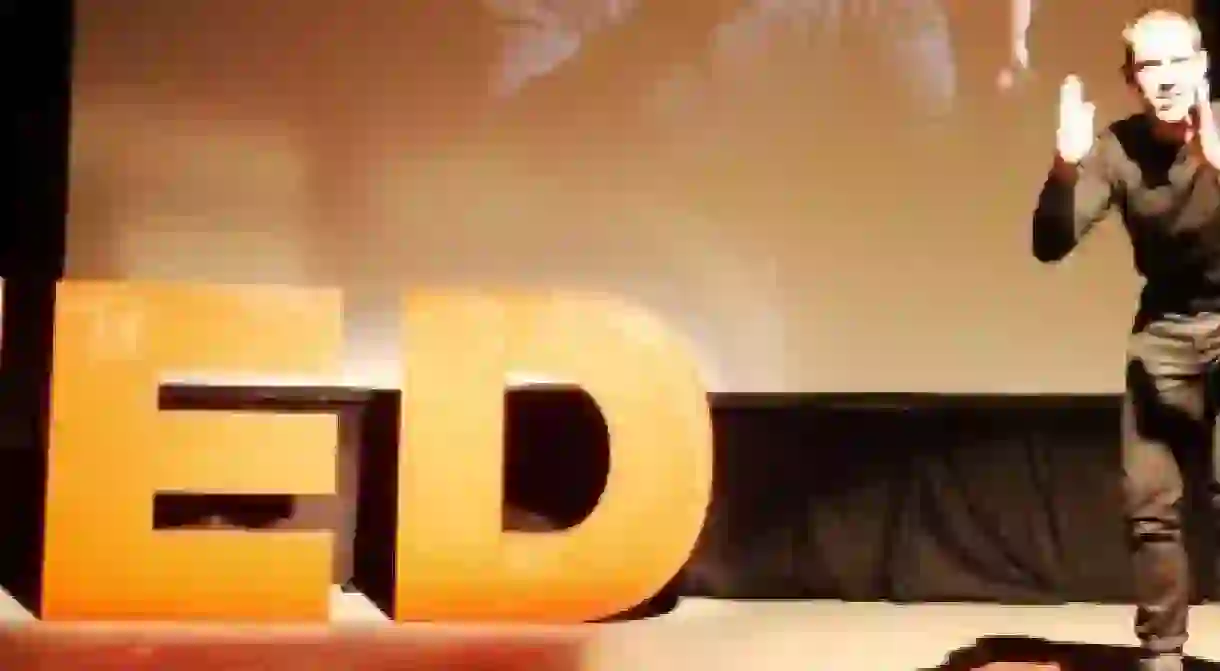The 10 Best TED Talks By Writers

Founded in 1984 with the first, one-off TED conference in Monterey, TED Talks are becoming a global phenomenon, providing fascinating ideas from remarkable speakers to anyone with access to the web. These are our favorite TED Talks from amongst those delivered by the writers invited to speak.
Chimamanda Ngozi Adichie: The Danger of a Single Story
In this celebrated talk, Nigerian novelist and nonfiction writer Chimamanda Ngozi Adichie discusses how she battled against dominant Western cultural narratives and stereotypes in order to discover her own authentic literary voice. An author who delves into Nigerian history in order to find inspiration for her diaspora writing, her latest novel Americanah fearlessly explores postcolonial issues of race and culture from a global perspective.
Benjamin Wallace: The Price of Happiness
Brooklyn author and journalist Benjamin Wallace discusses his exploration of the world’s most luxurious products. Despite being a regular contributor to high-end fashion magazine GQ, his humorous and thought-provoking exploration of consumerism probes the belief that subscribing to a culture of excessive spending might bring happiness.
https://youtube.com/watch?v=zdx5N9cvx_M
Elizabeth Gilbert: Success, Failure and the Drive to Keep Creating
For Elizabeth Gilbert, author of Eat, Prey, Love, the journey from “unpublished diner waitress” to famous writer has taught her that failure and rejection shouldn’t keep you from doing what you love. Her inspirational talk will provide you with motivation no matter what you do.
Andrew Fitzgerald: Adventures in Twitter Fiction
Andrew Fitzgerald is a writer and blogger, author of the 2010 novel The Collective and member of the News and Journalism Partnerships team at Twitter, where he helped launch the first Twitter Fiction Festival. In this talk he discusses the revolutionary potential for micro-blogging platforms to transform the way in which we experience narratives and storytelling.
Parul Sehgal: An Ode to Envy
Parul Sehgal, an editor at The New York Times Book Review, is a literary critic whose reviews are often as delightful as the books themselves. In her TED Talk, Sehgal eloquently examines jealousy through the prism of literature, meditating upon the quest for truth that lies behind this troubling emotion.
Pico Iyer: Where is Home?
This talk from acclaimed travel writer Pico Iyer explores the meaning of home and the disconnection from our “origins” many people experience in this increasingly globalized world. Iyer has published ten books, most famous for their examination of cultural isolation and the gulf between local traditions and global pop culture.
Amy Tan: Where Does Creativity Hide?
How can something come from nothing? This is the question Amy Tan seeks to answer in her talk on discovering creativity, and she does so in a dry, humorous manner. Celebrated author of books such as The Joy Luck Club, The Kitchen God’s Wife and The Hundred Secret Senses, there’s so much packed into Amy Tan’s fast moving discussion of the creative process you might want to watch it multiple times.
Daniel Suarez: The Kill Decision Shouldn’t Belong to a Robot
Daniel Suarez is a science fiction novelist who writes dystopian thrillers set in the not-to-distant future. In his 2012 novel, Kill Decision, Suarez explores the consequences of a technology that’s becoming already becoming available: autonomous bots and drones programmed to kill. In this startling talk, he highlights the danger of placing crucial decisions in the hands of machines.
A.J. Jacobs: My Year of Living Biblically
Imagine living a year of your life following every rule in the bible as literally as possible. This is precisely what author and journalist A.J. Jacobs did. One of the most intriguing writers in the United States, famous for his Esquire articles “My Outsourced Life” and “I Think You’re Fat,” this hilarious and fascinating talk explores both the wisdom and lunacy contained within biblical texts.
Chris Abani: On Humanity
Poet and novelist Chris Abani was imprisoned three times by the Nigerian government for his powerfully political prose, and used his experience as material for a series of poems that Harold Pinter called “the most naked, harrowing expression of prison life and political torture imaginable.” In this autobiographical talk he discusses the importance of compassion and humanity as a foundation for human societies and relationships.













